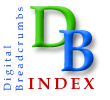
| Search |
 |
||||||||
| Words | Images | Audio | Scholar | ||||||||
|
||||||||
|
The individuals that have participated in our study thus far use a range of rich and complex knowledge-making strategies when they search for information online. This finding is consistent with information from a 2002 report sponsored by the Digital Library Federation, which indicates that while faculty and students in higher education institutions value the library and its services, they see it as "only one of many elements in a complex information infrastructure." More specifically, 33.3 percent of the entire study sample identified the library as one of the sources they consulted, and 32.8 percent rated it as the "most important" source (Friedlander, 2002). This result is also consistent with information found by Brad MacDonald and Robert Dunkelberger, whose 2000 study of the use of full-text databases found that students consult both World Wide Web resources and library databases with frequency. For all of our participants, research practices move beyond--and in some cases even exclude--the websites and databases of each individual's home academic institution library. For instance, all of the researchers use commercial research tools, such as Google and Amazon, to varying extents, both in conjunction with and instead of library-based resources, such as book or journal database searches. Among our participant-researchers, nearly all started searching with Google, and all used Google at some point during the search process. This finding resonates with a study completed by IProspect, a search engine marketing firm, which found that users definitely develop a sense of "brand" loyalty for their search engines and are likely to use the same engine for most (if not all) of their searches. IProspect [pdf] reported that 65 percent of users who rate Google as their favorite/primary search engine also said that they do not use any other search engines. The survey also found that users were more likely to re-launch a search in the same engine using different search terms rather than switch to a new engine after one unsuccessful search (2004, pp. 8, 11-14). Derek, for example, explained, "my searching then is sort of always around Google and using that for the most part. Probably even, I go there before the library, generally." Similarly, Mark shared, "for the most part I start out in a search engine, like Google." He explains further in the clip below. (For a complete transcript of the interview with Mark, see the Words link or download a pdf version here.)
Figure 1. Mark discusses his use of Google Janine, Derek, and Mark used Google as an initial search tool in preparation for their library searches. Mark, for instance, used Google to find general search terms to use in the library database. He said, "I generally don't want to find anything outside of the library database. The reason that I use search engines for the most part is so that I can get specific terms that I can use in the library database." Google, then, serves as the preliminary step of a library search. Janine and Derek agreed. They both indicated that they use Google to find a few key sources or authors and then look these up in the library to see how--that is, under what subject heading--these are categorized. Then they search in the library system using those subject keywords. The following examples illustrate the ways in which these researchers use Google as part of an array of multiple online tools. |